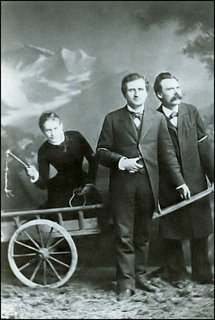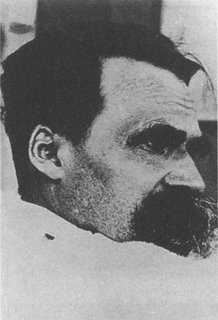The Artist's Philosopher
 You guessed it, Friedrich "Baby" Neitzsche gets my vote for being "The Artist's Philosopher". He's quite the cat and I don't believe any of those posthumous fictions of Anti-Semitism. Those were his sister's words.
You guessed it, Friedrich "Baby" Neitzsche gets my vote for being "The Artist's Philosopher". He's quite the cat and I don't believe any of those posthumous fictions of Anti-Semitism. Those were his sister's words.Here's the real thing...
For what purpose humanity is there should not even concern us: why you are there, that you should ask yourself: and if you have no ready answer, then set for yourself goals, high and noble goals, and perish in pursuit of them! I know of no better life purpose than to perish in attempting the great and the impossible ...Here's another one...
To recognize untruth as a condition of life—that certainly means resisting accustomed value feelings in a dangerous way; and a philosophy that risks this would by that token alone place itself beyond good and evil.try another...
The concept of "God" was until now the greatest objection to existence. We deny God, we deny the responsibility in God: only thereby do we redeem the world.
 He does write about creativity somewhere. Anyway, here's what Wiki says...
He does write about creativity somewhere. Anyway, here's what Wiki says...On January 3, 1889, Nietzsche had a mental collapse. That day two Turinese policemen approached him after he caused a public disturbance in the streets of Turin. What actually happened remains unknown. The often-repeated (and possibly apocryphal) tale states that Nietzsche witnessed the whipping of a horse at the other end of the Piazza Carlo Alberto, ran to the horse, threw his arms up around the horse’s neck to protect it, and collapsed to the ground.Eleven years after this the thinker dies. The cause of why he ceased to appear sane to the world remains unknown...
Early commentators frequently diagnosed a syphilitic infection as the cause of the breakdown; however, some of Nietzsche's symptoms seem inconsistent with typical cases of syphilis. Some have diagnosed a form of brain cancer. Others suggest that Nietzsche experienced a mystical awakening, similar to the mast-state studied by Meher Baba. [7] While most commentators regard Nietzsche's breakdown as unrelated to his philosophy, some, including Georges Bataille and René Girard, argue for considering his breakdown as a symptom of a psychological maladjustment brought on by his philosophy.
 The content of Nietzsche's work certainly provides enough material to support the last claim. What did the experts have to say?...
The content of Nietzsche's work certainly provides enough material to support the last claim. What did the experts have to say?...The psychologist Carl Jung recognized Nietzsche's importance early on: he held a seminar on Nietzsche's Zarathustra in 1934. [15] According to Ernest Jones, biographer and personal acquaintance of Sigmund Freud, Freud frequently referred to Nietzsche as having "more penetrating knowledge of himself than any man who ever lived or was likely to live".



0 Comments:
Post a Comment
<< Home